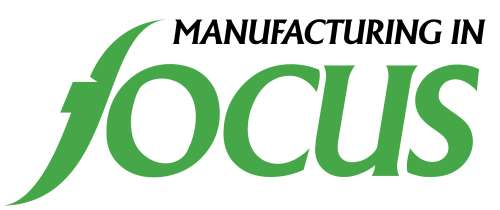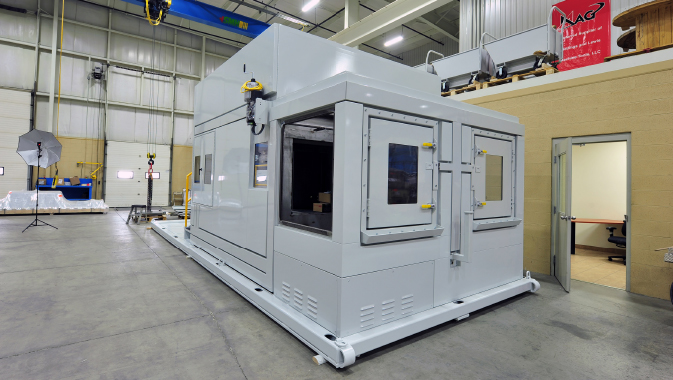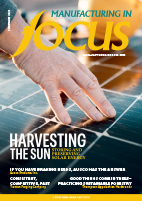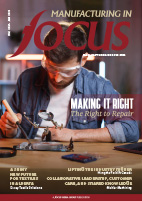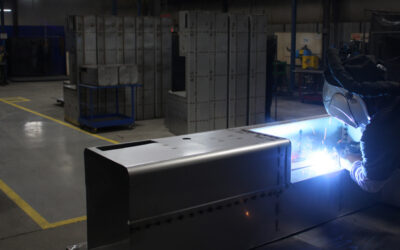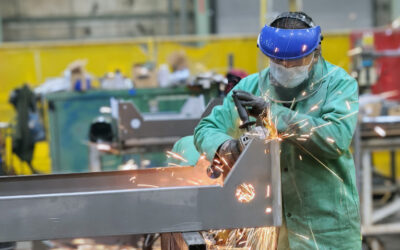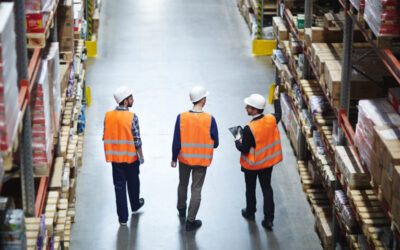Leamington, Ontario is an agricultural epicentre, world famous for its tomatoes. This small city in the southern part of the province is also home to Uni-Fab, a rapidly-growing, family-owned custom metal fabricator that has done work for Airbus, Boeing, and Blue Origin, the space-launch firm founded by Amazon boss, Jeff Bezos.
~
“Fabrication and machining is pretty much all we do,” states President and Owner Abe Fehr. “Companies build machines for automotive or aerospace. We fabricate and machine different parts for them. For some companies, we build machine enclosures. What that entails is, a company has a machine, and we build the housing that goes around it.”
Other company specialties include mezzanines, ladders, fencing, guarding, and working platforms made from steel, stainless steel, and aluminum for use in industrial settings. The company also builds hydraulic reservoirs.
Uni-Fab is based out of two facilities with a combined total of 112,000 square feet of space in Leamington. Fehr is debating whether to expand operations in Leamington or set up a branch in a different city. One way or the other, he wants the company to grow.
While Leamington is indeed agriculture-based, Fehr says, “It’s close to where I live. We used to be half-an-hour away in Windsor. A lot of my staff are from this area. When we decided to expand, about twelve years ago, we started looking in Leamington and found a piece of property here. We developed an industrial place.”
Machining, fabricating, and welding work is done on an array of equipment, including Mitsubishi lasers, Haas machining centres, TIG and MIG welding machines, press brakes, and more. The firm recently acquired a Salvagnini S4 + P4 flexible manufacturing system that particularly pleases Fehr.
“We can load sheet metal in one end of the line, and by the end of the line, you’ve got finished parts coming out. It punches and forms parts to whatever specifications you need,” he says. “I just think it’s a great piece of equipment, probably the best I’ve seen on the market.”
This new machine will give “the opportunity to get into some different markets [doing] production forming and doing parts on more of a mass scale than we’ve done in the past.”
Uni-Fab self-performs most of its work, except “a few things we can’t do, like sandblasting. We don’t have sandblasting equipment. We outsource that kind of stuff. We also do work with a couple smaller local fabricators when we get really busy. We will outsource some of the simpler fabrications, but mostly we do everything in-house,” explains Fehr.
This makes it a one-stop-shop, offering everything from design work to installation. “A lot of our customers will send us a drawing of what they have or tell us what they have,” he says. “We will do the engineering work upfront, get their approvals. Then we fabricate it. We powder coat it; we ship it, and we install it, whether it’s at their facility or their customer’s facility.”
Over the decades, the firm has been involved – directly or through work with a machine tool company – in several high-profile projects. “We built some large platforms – for the Boeing plant in Seattle – that the workers would stand on to assemble the 787 Dreamliner. We built platforms for Airbus. We’ve built hydraulic oil reservoirs for the second channel of the Panama Canal. These are 300-gallon reservoirs to hold hydraulic oil [used] to open and close the locks when the ships are going through,” he reports.
“Just recently, we built two 6,000 gallon hydraulic reservoirs for Jeff Bezos from Amazon for his space shuttle program, to house the oil for the shuttle when it’s put on a launch pad to be tilted up for a launch.” For all that, “most of the work is pretty routine,” he adds with a chuckle.
Roughly three-quarters of Uni-Fab’s customers are based in the United States. The remainder are primarily Canadian, although the firm has done work for clients in Mexico, China, and Japan. Given that much of what it fabricates and machines eventually crosses international borders, the company has been affected by the trade dispute between Canada and the U.S. Over the past two years, the Canadian and American governments have imposed tariffs on imports on aluminum and steel, among other items.
The tariffs “have certainly affected our business [in terms of] any materials we’re buying. Not so much Canadian materials, but U.S. materials. We’re fortunate right now that the economy is very good, and we’re still really busy. But if the economy were to slow up all of a sudden then [the tariffs] would be a super negative,” says Fehr.
Uni-Fab was founded in 1991 by Fehr and three partners, all of whom “came from a current competitor. We left here and started operations in Windsor,” he recalls.
From the start, the company focus was the same, albeit “on a much smaller scale,” he notes. “We started out about as lean and mean as we could – four partners working from very early in the morning until late at night. We were coming out of a recession in 1991, and we probably didn’t realize what we got ourselves into. We had to work super hard, but from our meagre beginnings, it’s progressed very well.”
In its first year of operations, Uni-Fab made under $1 million in sales. “Then we hit the $10 million mark, then $20 and $25 million. This year, we’re on target to surpass $30 million. We’ll be celebrating our twenty-eighth anniversary this fall,” states Fehr.
There have been changes along the way. Fehr is now the sole owner of the firm and employs his brother and son in the business. His daughter Mary will be joining the company this fall, after finishing her master’s degree at Wilfrid Laurier University (WLU) in Waterloo, Ontario. The “overall corporate culture is very family-oriented,” not surprising given the family-owned nature of the business.
The company’s success is based on a pretty simple formula consisting of hard work and jobs well done by a talented, dedicated staff. Uni-Fab employs almost 150 workers, which is up from roughly 135 last year at this time.
New hires such as welders, machinists, press brake operators, and painters obviously need the appropriate skill-sets. Beyond this, the primary attribute the company wants is “motivation to work. If someone wants to work, we usually can find a position for them. We’ve hired a lot of general labourers and moved them up the ladder or moved them from one spot to the next,” states Fehr.
Uni-Fab has certification from the Canadian Welding Bureau and American Welding Society and works to ISO 9001 standards. Maintaining quality comes down to having the right manager and right staff.
“We have the odd time where something doesn’t go quite to plan, but there’s always a solution, and we work with a customer. If you were to talk to my existing customers, even though they sign off on a project, if there’s something that comes up later, we’re there to work with them,” he observes.
Perhaps the best testament to customer satisfaction is the fact Uni-Fab relies heavily on word-of-mouth for promotional purposes. While it has a website, new work often stems from “customers telling other customers,” about their experiences with the firm, he explains.
In terms of suppliers, “We have a circle of vendors that we work with on a regular basis. I would think every year we’re introducing new vendors but our key suppliers have been with us a number of years. We work with them year in and year out. We have to work with a multitude [of vendors] because of the variety of different materials that we go through.”
Uni-Fab is quite involved in community and charitable initiatives. The firm put together a committee to help support a refugee family from Syria that came to Canada via a government assistance program. Fehr is involved with Mennonite Economic Development Associates (MEDA), a group that creates business solutions to poverty around the world, by helping the less fortunate start their business or farm. He serves on the MEDA Board of Directors and recently visited a project the group is sponsoring in Jordan.
He has ambitious plans for the future. “I could see us employing 200 people, doing $40 to 50 million in sales. Probably have an additional location, though I’m not sure where that would be,” says Fehr, of where he sees the company in five years.
A little bit further down the road, Fehr anticipates handing the reins of the firm to a family member, namely his daughter Mary. “My goal is that eventually, in a number of years down the road, she’ll be taking over my role. It’s my succession plan,” he says.
